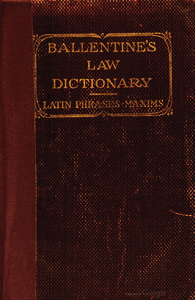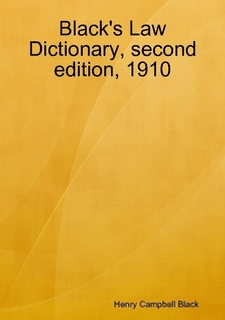A proceeding before a court of law to establish one party’s right against another. See 37 N. H. 457.
Definition of Action
-
Ballentine's Law Dictionary
-
Black's Law Dictionary: 2nd Edition
Conduct; behavior; something done; the condition of acting; an act or series of acts. In practice. The legal and formal demand of one's right from another person or party made and insisted on in a court of justice. Valentine v. Boston, 20 Pick. (Mass.) 201; Hibernia Nat. Bank v. Lacombe, 84 N. Y. 376; Appeal of McBride, 72 Pa. 4SO; Wilt v. Stickney, 30 Fed. Cas. 256; White v. Rio Grande Western R. Co., 25 Utah, 346, 71 Pac. 593; Bridgton v. Bennett, 23 Me. 420; Harger v. Thomas, 44 Pa. 128, 84 Am. Dec. 422; Peeler v. Norris, 4 Yerg. (Tenn.) 339. An action is an ordinary proceeding in a court of justice by which one party prosecutes another for the ehforcement or protection of a right, the redress or prevention of a wrong, or the punishment of a public offense. Code Civ. Proc. Cal. § 22; Code N. Y. § 2; Code N. C. 1883, § 126; Rev. Code N. D. 1899, § 5156; Code Civ. Proc. S. D. 1903, § 12; Missionary Soc. v. Ely, 56 Ohio St. 405, 47 N. E. 537; In re Welch, 108 Wis. 387, 84 N. W. 550; Smith v. Westerfield, 88 Cal. 374, 26 Pac. 207; Losey v. Stanley, 83 Hun. 420, 31 N. Y. Supp. 950; Lawrence v. Thomas, 84 Iowa, 362, 51 N. W. 11. An action is merely the judicial means of enforcing a right. Code Ga. 1882, § 3151. Action is the form of a suit given by law for the recovery of that which is one's due; the lawful demand of one's right. Co. Litt. 284b, 285a. An action is a legal proceeding by a party complainant against a party defendant to obtain the judgment of the court in relation to some right claimed to be secured, or seme remedy claimed to be given by law, to the party complaining. Haley v. Eureka County Bank, 21 Nev. 127, 26 Pac. 64, 12 In R. A. 815. Classification of actions. Civil actions are such as lie in behalf of persons to enforce their rights or obtain redress of wrongs in their relation to individuals. Criminal actions are such as are instituted by the sovereign power, for the purpose of punishing or preventing offenses against the public. Penal actions are such as are brought, either by the state or by an individual undor permission of a statute, to enforce a penalty imposed by law for the commission of a prohibited act Common law actions are such as will lie, on the particular facts, at common law, without the aid of a statute. Statutory actions are such as can only be based upon the particular statutes creating them. Popular actions, in English usage, are those actions which are given upon the breach of a penal statute, and which any man that will may sue on account of the king and himself, as the statute allows and the case requires. Because the action is not given to one especially, but generally to any that will prosecute, it is called "action popular;" and, from the words used in the process, (qui tarn pro domino rege sequitur quam pro se ipso, who sues as well for the king as for himself,) it is called a qui tarn action. Tomlins. Real, personal, mixed. Actions are divided into real, personal, and mixed. See Infra. Local action. An action is so termed when all the principal facts on which it is founded are of a local nature; as where possession of land is to be recovered, or damages for an actual trespass, or for waste affecting land, because in such case the cause of action relates to some particular locality, which usually also constitutes the venue of the action. Miller v. Rickey (C. Ct) 127 Fed. 577; Crook v. Pitcher, 61 Md. 513 ; Beirne v. Rosser, 26 Grat. (Va.) 541; McLeod v. Railroad Co., 58 Vt. 727, 6 Atl. 648; Ackerson v. Erie In Co., 31 N. J. Law, 311; Texas & P. R. Co. v. Gay, 86 Tex. 571, 26 S. W. 599, 25 In R. A. 52. Transitory actions are those founded upon a cause of action not necessarily referring to or arising in any particular locality. Actions are called, in common-law practice, ex contractu when they are founded on a contract; ex delicto when they arise out of a tort. Umlauf v. Umlaut, 103 111. 651; Nelson v. Great Northern R. Co.., 28 Mont. 297, 72 Pac. 642; Van Oss v. Synon, 85 Wis. 661, 56 N. W. 190. "Action" and "Suit." The terms "action" and "suit" are now nearly, if not entirely, synonymous. (3 Bi. Comm. 3, 116, et passim.) Or, if there be a distinction, it is that the term "action" is generally confined to proceedings in a court of law, while "suit" is equally applied to prosecutions at law or in equity. White v. Washington School Dist., 45 Conn. 59; Dullard v. Phelan, 83 Iowa, 471, 50 N. W. 204; Lamson v. Hutchings, 118 Fed. 321, 55 C. O. A. 245; Page v. Brewster, 58 N. H. 126; Kennebec Water Dist. v. Waterville, 96 Me. 234, 52 Atl. 774; Miller v. Rapp, 7 Ind. App. 89, 34 N. E. 126; Hall v. Bartlett, 9 Barb. (N. Y.) 297; Branyan v. Kay, 33 S. C. 283, 11 S. E. 970; Niantic Mills Co., v. Riverside & O. Mills, 19 R. I, 34, 31 Atl. 432; Ulshafer v. Stewart, 71 Pa. 170. Formerly, however, there was a more substantial distinction between them. An action was considered as terminating with the giving of judgment, and the execution formed no part of it. (Litt. § 504; Co. Litt. 289a.) A suit, on the other hand, included the execution. (Id. 291a.) So, an action is termed by Lord Coke, "the right of a suit." (2 Inst. 40.) Burrill.
—Mixed action. An action partaking of the twofold nature of real and personal actions, having for its object the demand and restitution of real property and also personal damages for a wrong sustained. 3 Bl. Comm. 118; Hall v. Decker, 48 Me. 257. Mixed actions are those which are brought for the specific recovery of lands, like real actions, but comprise, joined with this claim, one for damages in respect of such property; such'as the action of waste, where, in addition to the recovery of the place wasted, the demandant claims damages; the writ of entry, in which, by statute, a demand of mesne profits may be joined; and dower, in which a claim for detention may be included. 48 Me. 255. In the civil law. An action in which some specific thing was demanded, and also some personal obligation claimed to be performed ; or, in other words, an action which proceeded both in rem and in personam. Inst. 4, 6, 20.
—Personal action. In the civil law. An action in personam. A personal action seeks to enforce an obligation imposed on the defendant by his contract or delict; that is, it is the contention that he is bound to transfer some dominion or to perform some service or to repair some loss. Gaius, bk. 4, § 2. In common law. An action brought for the recovery of some debt or for damages for some personal injury, in contradistinction to the old real actions, which related to real property only. See 3 Bl. Comm. 117. Boyd v. Cronan, 71 Me. 286; Doe v. Waterloo Min. Co. (C. Ct) 43 Fed. 219; Osborn v. Fall River, 140 Mass. 508, 5 N. E. 483. An action which can be brought only by the person himself who is injured, and not by his representatives.
—Real action. At the common law. One brought for the specific recovery 'of lands, tenements, or hereditaments. Steph. PI. 3; Crocker v. Black, 16 Mass. 448; Hall v. Decker, 48 Me. 256; Doe v. Waterloo Min. Co., 43 Fed. 220. Among the civilians, real actions, otherwise called "vindications," were those in which a man demanded something that was his own. They were founded on dominion, or jus in re. The real actions of the Roman law were not, like the real actions of the common law, confined to real estate, but they included personal, as well as real, property. Wharton. In French commercial law. Stock in a company, or shares in a corporation. In Scotch law. A suit or judicial proceeding.
—Action for poinding. An action by a creditor to obtain a sequestration of the renis of land and the goods of his debtor for the satisfaction of the debt, or to enforce a distress.
—Action of abstracted multures. An action for multures or tolls against those who are thirled to a mill, i. e., bound to grind their com at a certain mill, and fail to do so. Bell.
—Action of adherence. An action competent to a husband or wife, to compel either party to adhere in case of desertion. It is analogous to the English suit for restitution of conjugal rights. Wharton.

